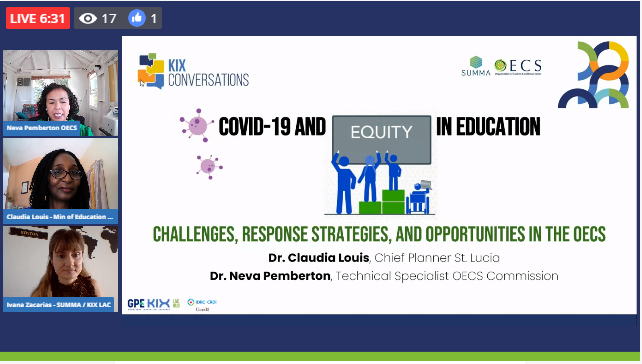COMPARTIR
Covid and equity in education: more than 150,000 students affected in Eastern Caribbean countries
February 12, 2021(scroll down for French version)

The third edition of the KIX Conversations delved into the current state of education in the Eastern Caribbean countries and the post-pandemic challenges and opportunities that exist.
Dr. Neva Pemberton, Technical Specialist in the Education Development Management Unit of the Organization of Eastern Caribbean States Commission; and Dr. Claudia Louis, Chief of the Planning Unit of the Ministry of Education of Saint Lucia and member of KIX LAC, were the guests of the third edition of the KIX Conversations, where, interviewed by researcher Ivana Zacarias. They spoke about COVID-19 and equity in education: challenges, strategic responses, and opportunities to build back better in the OECS.
The impact of COVID-19 on education providers affected 1,149 institutions from the early childhood to tertiary level, impacting 152,317 students and 10,859 teachers in English- Speaking OECS territories.
Dr. Pemberton emphasized that “OECS Member States have a relatively enabling legislative environment to pursue initiatives to strengthen equity, yet there needs to be more emphasis on the inclusion for students with disabilities and other special educational needs; additionally, because there is insufficient data to make evidence-based decisions to strengthen equity in education, effectively planning for equity and inclusion is constrained.”
“Education during the pandemic heightens existing equity concerns and presents new ones. With respect to the digital divide, primarily students of low socioeconomic status and from areas with limited connectivity are disproportionately affected,” said Claudia Louis.
In response to these issues, St. Lucia designed a plan of response strategies to improve equity in education, which include an income support program for the newly unemployed; the expansion of school welfare and psychosocial support programs; face-to-face attendance for students preparing for external exams; the distribution of devices and e-books to bridge the digital divide; and the Human Capital Resilience Project: skills training and social protection. The OECS Commission is also implementing a COVID-19 Response and Recovery Strategy that targets vulnerable students and teachers.
Opportunities to build back better centered on sustaining investments in ICTs and education to better reach vulnerable and out of school populations and mainstreaming programmes to mitigate against learning loss. The criticality of using an equity lens in pursuing policies, practices, and financing models to bring, to quote Dr. Pemberton “the margins to the center,” will contribute to more inclusive and equitable student outcomes.
In her closing remarks, Ms. Zacarias highlighted the important role played by the OECS in supporting the governments of the region to confront the pandemic.
The event was streamed live on Facebook and KIX LAC’s YouTube channel.
Event link: bit.ly/3jHa2Vl
KIX LAC is the Latin American and Caribbean hub of KIX (Knowledge and Innovation Exchange), a platform promoted by the Global Partnership for Education and the International Development Research Centre, which brings together the most diverse actors in education and aims to contribute to the strengthening of education systems in partner countries.
The regional network is led by SUMMA (Laboratorio de Investigación e Innovación Educativa para América Latina y el Caribe), and the Organisation of Eastern Caribbean States (OECS), and includes 8 member countries: Dominica, Grenada, Guyana, Haiti, Honduras, Nicaragua, St. Lucia,St. Vincent and the Grenadines.
Covide et équité dans l’éducation : plus de 150 000 étudiants touchés dans les pays des Caraïbes orientales
La troisième édition des Conversations KIX s’est penchée sur l’état actuel de l’éducation dans les pays des Caraïbes orientales et sur les défis et opportunités post-pandémiques qui existent.
Le Dr Neva Pemberton, spécialiste technique de l’Unité de gestion du développement de l’éducation de la Commission de l’Organisation des États des Caraïbes orientales, et le Dr Claudia Louis, chef de l’Unité de planification du ministère de l’Éducation de Sainte-Lucie et membre de KIX LAC, étaient les invités de la troisième édition des Conversations KIX, où, interrogés par la chercheuse Ivana Zacarias, ils ont parlé de COVID-19 et de l’équité dans l’éducation : défis, réponses stratégiques et possibilités de mieux reconstruire dans l’OECO.
L’impact de COVID-19 a touché 1 149 établissements d’enseignement allant de la petite enfance au niveau tertiaire, touchant 152 317 étudiants et 10 859 enseignants dans les territoires anglophones de l’OECS.
Le Dr Pemberton a souligné que “les États membres de l’OECO ont un environnement législatif relativement favorable aux initiatives visant à renforcer l’équité, mais il faut mettre davantage l’accent sur l’inclusion des étudiants handicapés et d’autres besoins éducatifs spéciaux ; en outre, comme il n’y a pas assez de données pour prendre des décisions fondées sur des preuves pour renforcer l’équité dans l’éducation, la planification efficace de l’équité et de l’inclusion est limitée”.
“L’éducation pendant la pandémie exacerbe les problèmes d’équité existants et en présente de nouveaux. En ce qui concerne la fracture numérique, les étudiants issus de milieux socio-économiques défavorisés et de zones à connectivité limitée sont touchés de manière disproportionnée”, a déclaré Claudia Louis.
En réponse à ces défis, Sainte-Lucie a conçu un plan de stratégies de réponse pour améliorer l’équité dans l’éducation, comprenant un programme de soutien au revenu pour les nouveaux chômeurs ; l’expansion des programmes de protection sociale scolaire et de soutien psychosocial ; l’assistance en face à face pour les étudiants qui se préparent aux examens externes ; la distribution d’appareils et de livres électroniques pour combler la fracture numérique ; et le projet de résilience du capital humain : formation professionnelle et protection sociale. La Commission de l’OECS met également en œuvre une stratégie de réponse et de rétablissement COVID-19 qui cible les élèves et les enseignants vulnérables.
Des possibilités de reconstruction mieux ciblées sur le maintien des investissements dans les TIC et l’éducation afin de mieux atteindre les populations vulnérables et non scolarisées et d’intégrer des programmes visant à atténuer les pertes d’apprentissage. L’importance d’utiliser une optique d’équité dans la poursuite des politiques, des pratiques et des modèles de financement pour apporter, pour citer le Dr Pemberton, “les marges au centre” contribuera à des résultats plus inclusifs et plus équitables pour les étudiants.
